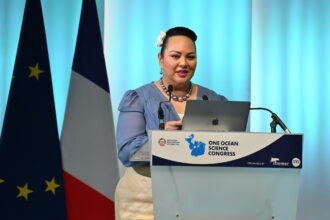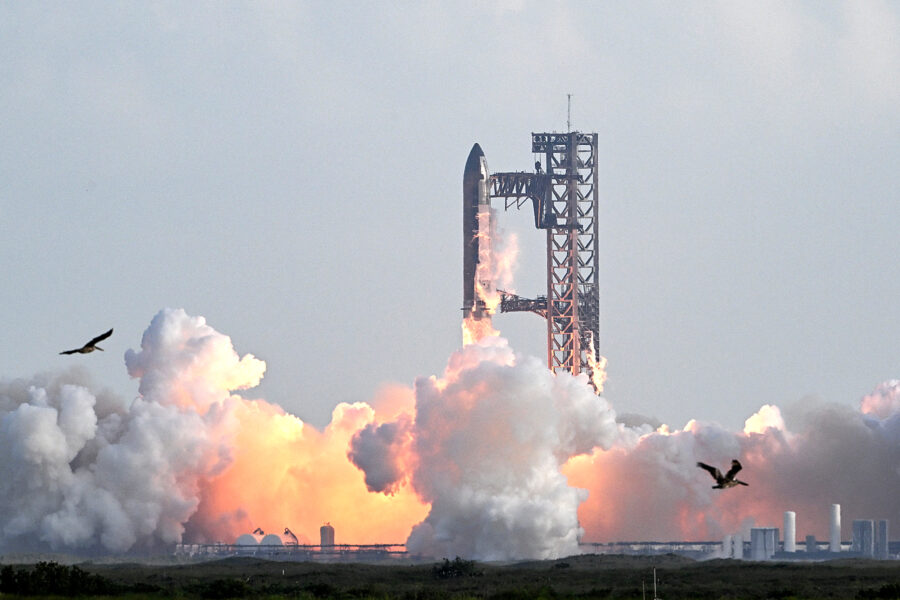Costa Rica is helping to shape the global agenda on marine protection and ocean governance this week as co-host, with France, of the 2025 United Nations Ocean Conference in Nice.
Costa Rica accounts for 20,000 square miles of land in Central America, but its marine territory covers nearly 200,000 square miles of ocean. About 30 percent of the waters are protected, including the Cocos Island National Park, which bans fishing and other extractive activities. The country also has one of the largest no-fishing zones in the Eastern Tropical Pacific, according to Global Fishing Watch, a nonprofit that helps governments manage ocean resources and combat illegal fishing.
At this third U.N. conference to protect the ocean, Costa Rica President Rodrigo Chaves Robles has pushed for heightened respect for the ocean and for nature.
“For decades now,” he said in a speech, “we have treated the ocean as a sort of infinite pantry or food store, but also we’ve treated it as a global waste dump.”
A former finance minister and president since 2022, Chaves Robles has been at pivotal discussions this week to reduce plastic production and consumption, to rein in bottom sea trawling and to impose a moratorium on deep sea mining.
Chaves Robles spoke with Inside Climate News to share his take on the talks in Nice and what he anticipates for the COP30 climate change gathering in Belem, Brazil, later this year.
This interview has been edited for length and clarity.
TERESA TOMASSONI: Costa Rica is one of the co-hosts of this year’s United Nations Ocean Conference. Explain the significance and how you envision Costa Rica’s role in shaping the future of ocean conservation.
RODRIGO CHAVES ROBLES: The significance is immense. We have come to realize that there is one ocean in the world. The resource is a common resource. The positive things that a country may or may not do to protect the resource have impacts on other countries and vice versa.
Costa Rica has been a leader because we are one of the first, if not the first, country to protect 30 percent of our ocean surface, our territorial waters. We have achieved incredible progress. In that sense, we have the Cocos Island National Park, which is bigger than our land mass. It is a no-take zone whatsoever, 50,000 square kilometers. Costa Rica, small country, big voice, working together with France, which is a leader within the European Union.
TOMASSONI: What is the most urgent action the international community must take to reverse ocean degradation? And what, in your opinion, is holding us back from making the necessary progress?
CHAVES ROBLES: What concerns me the most is not reversing what has been done. It’s avoiding further damage. The moratorium on deep sea mining should be the No. 1 priority.
What is the problem with deep sea mining? We don’t have enough scientific research available to know what may happen with the biomass of the ocean if mining were to occur.
Let’s be prudent with something that may not be reversible. Let’s wait. It is in our common interest as humans, as countries, to simply wait. Let’s find the options to make it acceptable for everybody, and let’s finance the research.
TOMASSONI: Financing scientific research has been a hot topic this week. What can be done to finance research and ocean protection in Costa Rica?
CHAVES ROBLES: We need to bring in fishermen from the coastal communities in Costa Rica. We’re working with them. We’re making payments for environmental services.
They are among the strongest supporters of this administration, and they are among the hardest-working people to protect the environment. That’s fascinating. They learned that they cannot destroy what provides their livelihood, which is the ocean.
Prince William gave [Costa Rica] £1 million as an Earthshot Prize. What did we do? We passed legislation allowing the government to pay for environmental services. Then we complemented the budget. We put in an additional $7 million to start a meaningful pilot project that is extremely successful that supports women planting mangrove trees.
This story is funded by readers like you.
Our nonprofit newsroom provides award-winning climate coverage free of charge and advertising. We rely on donations from readers like you to keep going. Please donate now to support our work.
Donate NowTOMASSONI: There’s a lot of discussion around promoting a “blue economy.” Can you explain what this is and its potential to support conservation? [NOTE: The term “blue economy” generally refers to economic activities related to the ocean and encompasses traditional fishing and shipping sectors as well as aquaculture, marine biotechnology and coastal tourism.]
CHAVES ROBLES: Look, tourism is growing. Costa Rica is a country that is a classic example—and I understand you have been there. It’s a classic example of how tourism of high value is added just because it has nature.
Wild animals are worth more on a tree, in a forest, financially speaking, than cattle or sugar cane plantations. One of the most profitable activities that we have is deep sea fishing. These fish are caught for sport and released immediately. That generates a lot of work, jobs and income for coastal societies and protects the species. There is a lot to be gained from the ocean if we manage it correctly.
TOMASSONI: There’s an urgent push for nations to protect 30 percent of their waters by 2030 in order to reverse biodiversity loss, but we know, from this week’s discussions, that many marine protected areas are not sufficiently monitored. Some scientists have mentioned that Costa Rica is still struggling to combat illegal fishing of sharks. Can you explain what you’re doing to manage marine protected areas, and particularly vulnerable species like sharks being illegally fished?
CHAVES ROBLES: There are lots of “paper parks” in the world. In Costa Rica, we don’t have any paper parks. We are protecting.
We have reduced the catch of sharks enormously by collaborating together with the fishermen and changing fishing technology so it’s less harmful to sharks. We changed the fishing hook. We have also installed satellite tracking mechanisms on most of our ships, right, and the legal ships are reporting the ones doing illegal fishing.
So there is progress. Is it perfect? Not yet. But I think that with technology, strong public policies and working with those who would benefit from a more sustainable ocean, we will get there.
“Who contaminates has to pay and who cleans has to be paid.”
TOMASSONI: What other commitments are you urging countries to make?
CHAVES ROBLES: Conserving biodiversity beyond national jurisdiction is an enormous priority. We hope that we will get a treaty sometime soon. I think that we will reach the required 60 countries needed to turn the agreement into international law at the United Nations General Assembly. We gained a large number of countries that ratified the treaty here in Nice.
Aside from the [High Seas Treaty], if we get the moratorium on deep sea mining, I’ll be a happy camper.
Obviously, we need to change the economics of the plastic industry, too. We need to change the relative price of biodegradable packing materials versus, you know, regular plastics. We need to put [in place] better economic management. Who contaminates has to pay and who cleans has to be paid. Those things will come.
TOMASSONI: Looking ahead to COP30 in Brazil, how is Costa Rica working toward integrating its commitments made here at the U.N. Ocean Conference into its broader climate agenda? What key messages or priorities should carry forward from this summit?
CHAVES ROBLES: Costa Rica is a tiny, little country. We are not a world-changing country in terms of our policies. In other words, we can do what is good for us, but we’re not going to change climate change by ourselves, even though we have achieved zero emissions in agriculture, net emissions; even though our electricity is 98 percent renewable. We’re not changing the world. The contribution of countries like Costa Rica is that we’re planning to protect our oceans.
We’re, as you Americans say, we are walking the walk and not just talking the talk. Stop giving excuses. It should be done. It can be done.
About This Story
Perhaps you noticed: This story, like all the news we publish, is free to read. That’s because Inside Climate News is a 501c3 nonprofit organization. We do not charge a subscription fee, lock our news behind a paywall, or clutter our website with ads. We make our news on climate and the environment freely available to you and anyone who wants it.
That’s not all. We also share our news for free with scores of other media organizations around the country. Many of them can’t afford to do environmental journalism of their own. We’ve built bureaus from coast to coast to report local stories, collaborate with local newsrooms and co-publish articles so that this vital work is shared as widely as possible.
Two of us launched ICN in 2007. Six years later we earned a Pulitzer Prize for National Reporting, and now we run the oldest and largest dedicated climate newsroom in the nation. We tell the story in all its complexity. We hold polluters accountable. We expose environmental injustice. We debunk misinformation. We scrutinize solutions and inspire action.
Donations from readers like you fund every aspect of what we do. If you don’t already, will you support our ongoing work, our reporting on the biggest crisis facing our planet, and help us reach even more readers in more places?
Please take a moment to make a tax-deductible donation. Every one of them makes a difference.
Thank you,













